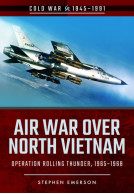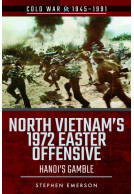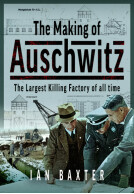Vietnam's Final Air Campaign (Paperback)
Operation Linebacker I & II, May–December 1972
Imprint: Pen & Sword Military
Series: Cold War, 1945–1991
Pages: 128
Illustrations: 80
ISBN: 9781526728456
Published: 21st January 2019
(click here for international delivery rates)
Need a currency converter? Check XE.com for live rates
| Other formats available | Price |
|---|---|
| Vietnam's Final Air Campaign ePub (4.4 MB) Add to Basket | £6.99 |
On March 30, 1972 some 30,000 North Vietnamese troops along with tanks and heavy artillery surged across the demilitarized zone into South Vietnam in the opening round of Hanoi’s Easter Offensive. By early May South Vietnamese forces were on the ropes and faltering. Without the support of U.S. combat troops – who were in their final stage of withdrawing from the country – the Saigon government was in danger of total collapse and with it any American hope of a negotiated settlement to the war. In response, President Richard Nixon called for an aggressive, sustained bombardment of North Vietnam. Code-named Operation Linebacker I, the interdiction effort sought to stem the flow of men and material southward, as well as sever all outside supply lines in the first new bombing of the North Vietnamese heartland in nearly four years. To meet the American air armada, North Vietnamese MiG fighters took to the skies and surface-to-missiles and anti-aircraft fire filled the air from May to October over Hanoi and Haiphong.
With the failure of its Easter Offensive to achieve military victory, Hanoi reluctantly returned to the negotiating table in Paris. However, as the peace talks teetered on the edge of collapse in mid-December 1972, Nixon played his trump card: Operation Linebacker II. The resulting twelve-day Christmas bombing campaign from 18–30 December unleashed the full wrath of American air power. More than 2,200 attack sorties, including 724 B-52 sorties alone, were flown by Air Force and Navy aircraft delivering 15,287 tons of bombs that laid waste to the North Vietnamese capital. Railyards, military storage depots, power stations, and bridges, as well as radar and communication sites, airfields, and anti-aircraft defences were pummelled day and night. Linebacker II would prove to be decisive: a ceasefire agreement was signed on 23 January 1973.
This book tells the story of these raids and is a great addition to the Pen and Sword range. At just over 100 pages it can be completed in short order (in my case a Sunday pm). The style is light and technically savvy, with many illustrations, photos and maps.
Navy Net
Having just returned from a study trip to Vietnam, I was somewhat pleased to receive this volume, as it fleshed out the knowledge I had acquired in somewhat greater detail.
Read the full review here
How the U.S. answered the challenge with two aerial bombardment campaigns is told exactingly by Stephen Emerson, the son of a naval attack pilot who flew combat tours in the war.
Aviation History, March 2021
Featured by
Cocardes May-June 2019
As featured in
Fliegerblatt, February 2019
While the work reflects sympathies with the American forces, Emerson also pays homage to the North Vietnamese fliers and defenders for their successes in downing over one hundred American aircraft and to the defenders for rapidly rebuilding destroyed economic and military infrastructure until being overwhelmed by Operation Linebacker II.
Prof. Chaitram Singh, Berry College
It is an unusual feat for a foreign policy analyst to present a diplomatic-military tango of this magnitude and import with such comprehensiveness, clarity, and compelling drama.
This book provides a concise overview of the political and military aspects of the campaign.
History of War, issue 67
The story is told here with clarity and supported by many well-selected images through the body of the text.
Firetrench
Read the full review here
Stephen Emerson’s latest book covers the last year of operations in the air war in Vietnam and it is superb. He focuses on Operations Linebacker I and Linebacker II and he demonstrates how these operations were able to force the North Vietnamese to make the concessions necessary to end America’s direct participation in the Vietnam War.
Colonel Roger Ducey, U.S. Air Force (ret.)
He sets the stage by describing the political situation faced by President Nixon and reviews Nixon’s strategy of Vietnamization and how the reduction of U.S. combat ground troops forced Nixon to rely on air power as his sole means of leverage in reaching a peace accord.
Finally Emerson does a masterful job of describing how U.S. Navy and Air Force aircrews and planners put together a bombing and mining strategy to not only destroy and suppress the North’s air defenses, but also to cut off supplies from the USSR and China. The book shows the true courage that aircrews displayed day after day flying into the strongest air defense system in the world at the time. Despite heavy losses, these aircrews forced the North Vietnamese to accept an agreement that was acceptable to all sides.
This is a well-written and well-told volume... it may be of interest to aviation and military historians, while readers seeking clarification as to what who did what and why during the latter days of the Vietnam War, may also find it informative. Due to the large number of aviation-related images military-aviation enthusiasts and aero modellers may also find this book useful in their researches.
Keith Rimmer, NZ Crown Mines
This story took place over 45 years ago so to many this is history only. I am of an age that I remember all this happening and reading the 'extra' information that was not widely known at the time makes for an interesting read. The book is illustrated with maps, formation diagrams and archive photos.
Military Model Scene, Robin Buckland
Another good addition to this Cold War series and a very readable book.
Read the full review here
An excellent book exploring the geo-political pressures that forced President Nixon to order a massive bombing campaign against North Vietnam in order to bring the North Vietnamese to the peace negotiation table. The USA had decided that the ground war was to become the responsibility of the South Vietnamese regime but it was clear that the North enjoyed the means to win it. Airpower remained the USA’s only viable means to change that situation and secure a negotiated peace. The book explores the depth of planning and the sheer scale of the prolonged delivery of the campaign. A good narrative that offers significant insights into the end of the Vietnam War.
Michael McCarthy
Michael McCarthy. Battlefield Guide
About Stephen Emerson
Stephen Emerson was born in San Diego, California into a U.S. Navy family; his father was a career naval aviator and his mother a former Navy nurse. Steve and his siblings grew up on various Navy bases during the Vietnam War. His father served two combat tours in Vietnam flying both the A-4 Skyhawk and the A-7 Corsair II and participated in Operation Rolling Thunder while flying off the U.S.S. Midway in 1965 with Attack Squadron 22.
Steve worked as intelligence analyst covering political-military affairs in Africa and the Middle East before embarking on an academic career. He served as Security Studies Chair at the National Defense University’s Africa Center for Strategic Studies and previously as an associate professor of National Security Decision-making at the U.S. Naval War College in Newport, Rhode Island. Steve has written widely on subjects from American national security affairs and political instability to terrorism, African conflicts, and counter-insurgency. Chief among these are his critical assessment of U.S. counter-terrorism policy in Africa, ‘The Battle for Africa’s Hearts and Minds’, and his comprehensive military history of the Mozambican civil war in The Battle for Mozambique. He holds a PhD in International Relations/Comparative Politics from the University of Florida and currently resides in Orlando, Florida.
























